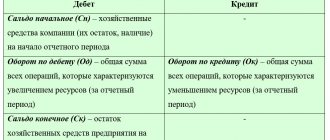Due to the coronavirus pandemic, some people lost their jobs and were forced to go into quarantine, waiting for the lifting of restrictive measures. It so happened that in June many organizations will start operating again, and people will be able to find a new place of work. On this occasion, we decided to tell you what questions to ask an employer during an interview in order to find out all the necessary information about the vacancy and at the same time show your boss your interest.
Despite the fact that most materials about interviews are devoted to potential questions from the employer, you should not forget about the counter-questions of the applicant. After all, any interview always involves two-way communication.
- Money and career Should you leave your job or stay? Let's deal with the main career dilemma Now you can test yourself.
To do this, any interviewer always asks the question: “Do you have any questions for me?” Don't be afraid to take advantage of this moment and try to get comprehensive information about all aspects of your future work. Believe me, this is the best way to understand whether you will like this position and whether your goals coincide with the goals of the company.
Plus, you'll be able to demonstrate your enthusiasm, which is very important for the hiring manager's final decision.
So, we have compiled a list of the main interview questions that employers should ask. Take note.
What else can you ask during an interview with an employer?
Naturally, you should not ask all the questions from our list at once, otherwise it will seem that it was not you who came for the interview, but to you. You should always act according to the situation and in accordance with the context of the conversation.
If the above-mentioned questions are not enough for you, here is another small list that may be useful in a conversation with an employer.
- Does my position require participation in additional projects?
- How common are promotions for people in my position?
- What responsibility will I bear to the company?
- What will my salary be?
- Do you have bonuses for overtime?
- Does the company provide additional training for its employees?
- Does the company have a strict dress code?
- Tell us about the procedure for applying for a job;
- Tell us about the company's plans for the next three, five or ten years.
- Author: Dmitry Petrosyants
The importance of the interview and how to conduct it
The ability to conduct an interview depends on the personal qualities of the leader. Not only business skills are important, but also knowledge of the requirements of recruiters. The interview itself is a negotiation in which both parties are interested in a positive outcome: the employer wants to find a professional, and the person who came for the interview wants a good job.
Types of interviews
Searching for a specialist to fill a vacant position in a company has many features. Depending on the qualities of the applicant, as well as on the specifics of the enterprise, the manager can choose one of the interview methods. It can have a structured form, free or combined.
A structured interview is conducted according to an existing plan, in which each item reflects the parameters of a person’s professional and personal qualities. Free meeting – obtaining the necessary information from the applicant without an existing plan. The combined method includes individual features of the two previous methods. These forms have some subspecies. Their description is given below.
- Structured. According to interviewers, this type of meeting is the most effective. It is important to prepare a list of questions based on the data that the applicant indicated in the application form or resume.
- Situational. Aimed at identifying the specialist’s abilities. He is given a specific task and is given some time to complete it. The manager’s task is to find out how a specialist acts in a simulated situation.
- Projective. Helps to obtain information about the psychological type of a specialist. The employer creates a fictitious situation and talks about the actions of fictitious individuals in it. A person must evaluate their behavior and determine his reaction in such a situation.
- Behavioral. Assessing the adequacy of the response to the assigned tasks, identifying the professional qualities of the applicant.
- Stressful. Using this type of interview, you can determine a person’s stress resistance, as well as his tendency to create conflicts. The employer must analyze the actions of the applicant for the vacancy, forcibly removing him from a comfortable state.
- Group. Its advantage is a quick interview and time saving.
Conducting an interview with an applicant for a job at an enterprise requires maximum confidence in their strengths and capabilities not only from the applicants, but also from the employer. Therefore, it is best to conduct interviews according to a prepared plan, giving preference to its strict form (structured type).
Conducting a conversation on the phone
To hire a specialist, the employer must arrange a meeting with him. The resume can be compiled perfectly, and the recruiter himself will be sure that this person is the one the company needs. But no one is immune from mistakes, so a personal meeting is useful. But if this is not possible, we can agree otherwise. A few minutes of talking on the phone is enough to understand whether it is worth meeting a person in person. The conversation plan is presented below.
- You should introduce yourself and ask if the person is comfortable talking. Some potential employees are looking for a new job without leaving their old company. This information is also valuable.
- Need to be reminded about the vacancy.
- You should clarify the details that you would like to know about the specialist. You can also ask some additional questions.
- If the specialist is not suitable, you can end the conversation by politely saying goodbye. If the employer is interested, the applicant is invited to a personal meeting.
In the digital age, you can also hold a meeting via video conference. But it is not recommended to replace a personal meeting with it. But you can replace her talking on the phone, because there is also eye contact.
Interview questions for a management position
Employers like to ask future managers these questions:
- “Tell me about ways to improve the efficiency of the department you led in your last position.” - Even if you are a so-so leader, do not rush to declare it. Think about situations in which you took initiative successfully and usefully. Tell us about them
- “What methods of motivating employees do you actively use?” — This question should be answered very thoughtfully. Don't rush to talk about salary increases. There are other equally effective ways
- “Tell me about your worst mistake at work. What lesson did you learn from it?” - Do not deny the presence of this error. Then the employer will immediately decide that you are lying and you will not see the desired position. If there was some huge disaster in your career, don't mention it. Tell us about a serious problem and how you deftly overcame it
- A question about finances and your desired salary. Don't give a specific number. Let them know that you are ready to work for the fee offered to you by the company
- The answer to the question about improving professional skills is given above in the article
Interview questions for a sales manager
The sales manager is a lower rank than the head of the sales department. The requirements for it are lower than for the latter. Most likely, the employer will not ask you to simulate the situation, but will ask the following questions, in addition to the basic ones:
- “Rate your level of sales knowledge on a scale of 1 to 10.” — Tell it like it is, but sometimes you can raise the bar a little. But only if your sales skills are not very high.
- “Name the main qualities that a sales manager should have.” - Your logic will be needed here. It is better to prepare for such a question in advance. Remember your best qualities and the qualities you lack to become a successful salesperson. Name them
- “Why should I (the employer) hire you?” — One of the most provocative questions. Talk about sales and your successes in this area. Prove yourself
Main stages of the interview
Knowledge of all the features of its main stages will also allow you to conduct an interview correctly. It is incorrect to start a survey without getting to know the person and assessing his behavior during the conversation. It would be a good idea to find out what the potential employee knows about the company and the features of its work. Therefore, the manager must adhere to a clear plan for conducting the meeting, which can be divided into 3 stages.
- Acquaintance. A potential employee is assessed based on his appearance and personal data. A person presents himself, thereby leaving a certain impression on his possible superiors.
- Testing. The main stage of the interview. The employer receives information about the specialist’s professional skills, competence and abilities.
- Informing potential employees. You should tell the person about the enterprise, type of activity and certain features of specialization. More attention is paid to the duties that a job applicant can perform.
This model most effectively reveals not only a person’s professional skills, but also his character traits, as well as the ability to conduct dialogue in a business manner.
How to answer awkward questions at an interview?
Awkward questions are every potential employer's favorite part. It is by this that they identify the hidden sides of a potential employee that he did not mention in his resume.
- One of the most inconvenient is the question asking you to tell about yourself. People begin to get nervous and most often talk about their hobbies, views on the world order, and relatives. To avoid embarrassment, say 3-4 sentences in general terms about your qualities and a few words about your hobbies
- Women are often asked about their personal life and whether it will interfere with work. After all, there is a certain danger that a woman may go on maternity leave or sick leave. Answer firmly that it won’t hurt
- The next question is about achievements. Don't talk about first place in the intra-school long jump competition. This is unlikely to apply to your current job. Talk about how you have grown professionally. Restrained, natural
- It may sound strange, but some employers are genuinely interested in your zodiac sign. And if they don't like him, they'll show you the door. It's stupid, but it happens. You should not lie when answering this question. If you are refused, thank them and silently leave the office. A serious company will never be interested in such things
How to successfully interview for a leadership position?
Job interview.
- You should prepare in advance for an interview for a managerial position. You should leave behind the impression of a knowledgeable and confident person in yourself and your actions. Choose a suitable suit, be sure to make sure that the tie matches the shoes
- Although now this is no longer relevant in everyday life, business etiquette dictates its own rules. If you are a woman, do not dress vulgarly or very brightly. Choose discreet colors in clothes, makeup, manicure
- You should look confident and calm. Show emotion in situations where it is appropriate. Gesture, but not too actively. This indicates excessive emotionality. Always let me finish the sentence, don't interrupt
- It is important for you, more than anyone else, to show your best side. Try to demonstrate as many qualities as possible that a leader should have. Your potential employer should understand from the interview with you that you are a reliable person. Employers do not tolerate criticism of themselves at the interview stage. This also needs to be taken into account
Interview questions for an administrator
The administrator must be able to talk with people and resolve controversial situations that arise. His main qualities are sociability and the ability to quickly find the right solution.
An employer has the right to ask you about communication skills. He is not interested in any sales, because the main thing for you is consultation on service issues and monitoring the activities of employees.
Key questions
When forming a list of questions, it is important to think not only about their content, but also to build the right chain. The entire conversation should be logical and with a strict structure. To conduct an interview correctly, you can use questions of a certain content:
- Tell us about yourself. Important information here is:
1.1. The method of presenting information is whether the candidate began with a biography or immediately began to praise himself. In this case, the main thing is to catch the level of boasting or modest presentation of advantages and benefits, which indicates a desire to work in this organization.
1.2. Conversation style - the candidate must answer clearly and in understandable phrases. The use of jargon and slang phrases is not permitted. For an employer, it is important how a person speaks and how he formulates his thoughts.
- What is your outlook on life? In this case, you can ask the candidate how he dealt with difficulties and difficulties. The answers provide insight into character. If he is a pessimist, then the answers will be focused on problems, but if he is an optimist, then the focus will be shifted to the method of dealing with obstacles.
- Why is the proposed position interesting to you? Almost all candidates answer according to the template, listing working conditions and prospects. However, a valuable specialist will pay attention to the key details of the position, which will indicate his true interest.
- Tell us about your strengths. This question implies an interest in why the candidate decided that he should get the position. Applicants can submit information. and streamlined and reasoned, but for the employer, facts and exact figures are more important, which are confirmed by the candidate’s work results at the previous place of work.
- Tell us about your weak points. A candidate who is preparing for an interview and understands how to behave during a personal conversation knows that he needs to draw attention to the disadvantages of his character in such a way that for the boss they are only significant advantages.
- What are the reasons for leaving your previous job? What was your reputation there? Such questions should be asked of a candidate who is currently unemployed. If the applicant is still working in another place, then it is worth finding out in more detail about the reasons that led to the decision to change the organization and workplace. Here it is important to monitor the intonation and the level of anger and indignation - if a lot of negativity comes from the candidate, then it is hardly worth expecting something positive from him in the new place. A competent and well-mannered employee will certainly inform you about the positive aspects of his previous job, but will note that his aspirations or desires no longer correspond to the position he held until that moment.
- Do you have any other options for getting a job? Many people need a qualified specialist and therefore they will call him to work somewhere else. A smart applicant will focus not on the fact that it is in great demand, but on the fact that this vacancy interests him the most and that is why he would like to work here.
- How do you imagine yourself in 7-10 years? Few people make long-term plans, but it is those who think a few steps ahead who are the most promising employees. A specific answer is important here - no streamlined and general phrases. The applicant must clearly outline the picture of the world within the chosen position and the expected career growth. However, it is important that these plans do not contain excessive bragging and stupid hopes.
- How can you get information about how you worked at your previous job? The applicant should provide information from a manager or colleagues who can give him a description that will highlight the merits and professional qualities of the applicant. If there are no contacts and the candidate refuses to contact his former and future managers, then it is recommended to think about the fact that the applicant most likely did not have the best reputation in his previous job and he is simply trying to hide it.
- Determine the size of your desired salary. Every highly qualified employee values his time, and therefore knows his worth. However, it is important that the candidate declares the amount of payment that will be adequate to his knowledge and skills. The employer, in turn, must objectively indicate the salary, which will suit the applicant and allow him to think about whether these conditions are suitable for him. You can try to bargain and thereby check how the candidate will behave when he is told a lower cost for his services.
- What activities do you choose in your free time from work? This question should be left for last when ending the interview. The answers make it possible to understand whether there are common interests - this always has a positive effect on working relationships and contributes to a strong corporate spirit.
All of the above questions allow you to make the first and, perhaps, main impression about the person applying for the vacancy. However, to complete the picture, you can use original and unexpected questions, which can help you look at a person from a different perspective. These issues may include:
- What kind of superhero would you like to be? The answers to this question make it possible to understand which qualities of the plan are of the greatest value and importance for the candidate.
- Describe your ideal job. Everything is important here - conditions, schedule, scope of production and method of activity. Based on the answers, you can get an idea of what matters in the professional sphere of the candidate’s life. In addition, you can assess how honest and hardworking the candidate is.
- What shortcomings, in your opinion, became the most obvious to management? This question reveals weaknesses. In addition, it is possible to assess the adequacy of the candidate relative to himself.
- What methods are acceptable to join a new team as quickly as possible? Any answers allow you to assess the degree of communication skills of the candidate and get a general impression of what colleagues will expect if this person joins the staff.
- Explain the term from the field of activity in words that the child can understand. The term is defined by the leader. From a quick and simple explanation, it becomes clear how clearly the applicant is oriented in professional life and how deep his knowledge of production terminology is.
All these questions make it possible to piece together a picture of qualities. The boss receives an adequate and objective assessment of the applicant and can calmly decide whether a deeper dialogue makes sense.
How to successfully pass interviews: tips and feedback
To successfully pass interviews, meet the following requirements:
- Act a little reserved, but not constrained
- Never cross your legs or cross your arms over your chest.
- Talk to your employer as equals
- Tell us about your best qualities as a specialist
- If the employer's question seems too personal to you, change the topic if possible or ask a counter question
- Watch your speech. Pronunciation must be correct
- Your clothing sets the overall tone of the conversation and creates a certain impression about you. Take your clothing choices seriously
Job interview test
Pre-employment testing is carried out by employers quite often. Especially in cases where the company is interested in hiring the most suitable employee for the position, and not a person from the street.
There are two types of tests:
- To test professional knowledge
- To test general knowledge
Tests to test your professional knowledge contain questions directly about your profession and related areas. To prepare for such a test, think about what you do poorly or not at all at work. Read books or articles on the Internet about this. A seminar or a detailed video course would be a good help.
The General Knowledge Test is very similar to a regular school test. You are required to have knowledge of school subjects and a broad outlook. Of course, the employer will not ask you to solve the most difficult problems from the Unified State Exam, but the level of your knowledge should be appropriate for the position you want to get.
How to formulate questions correctly
To get a truthful answer, you need to ask open-ended questions. They always begin with question words - when, with what, why, how many and others.
| Closed questions | Open questions |
| So no need to ask | This way, asking them will be as effective as possible. |
| Didn't you like your previous job? | Why did you decide to change your job? |
| Have you done this, this, and this? | How do you see your work in our company, what will it consist of? |
| Are you sociable? Will you be able to join the team? | How would you characterize the team at your previous job? How were your relationships with your boss and colleagues? What traits of a leader turned you off? |
| Can you handle the job? | Why are you suitable for this position? What are your knowledge and advantages? |
Closed questions are those that do not require a detailed answer, just yes or no. They are used exclusively to collect formal information. Do you smoke? Have a family? Do you have your own car? And others.
There is no need to give the applicant hints, offer answer options, or say anything else immediately after the question.
| So no need to ask | It will be right |
| If it's not a secret, tell me, what was your salary at your previous job? | What salary would you like to receive from us? Which one are you counting on? |
| What exactly did you not like about your last job – boss, team, low salary? | Why did you decide to change your job? |
There is no need to set other applicants as an example. Under no circumstances should a leader talk much himself.
Asking questions
It is also important to ask correctly. There should be a certain logic in the sequence of questions. There is a transition from easy introductory ones to more complex ones that require an open answer.
A ready-made model (template) compiled during the first interviews is used. But if it doesn’t exist, it’s important to take care of creating it. A list is compiled according to professional profile, competency model and job description. A sample list of questions should look like this:
- What interested you in the vacancy?
- What are your advantages and disadvantages?
- Why did you leave your previous job?
- How do you see yourself in the future?
- Is it possible to get a reference from a previous place of work?
- What salary would suit you?
You can also ask what the person does in his free time. The presence of hobbies indicates that you have a comprehensively developed personality. But if his answer is related to extreme sports, you should be wary. The fact is that such people like to take risks, which can harm the enterprise.
Professional questions
Professional issues are basic. It is important for the employer to understand how the employee’s professionalism corresponds to the data specified in the resume or application form, as well as to evaluate business skills that will be useful when working in a team. The questions below are usually asked.
- Do you speak a foreign language? If so, which one?
- Think about your previous place of work (the answer will help to clarify some of the characteristics of a person’s work, his ability to solve problems and adequately respond to criticism).
- Can any of your former colleagues recommend you?
- Can you work overtime?
- What would be your ideal job?
The recruiter should also monitor the applicant as he answers questions. Certain gestures or facial expressions may indicate problems. Often, applicants hide their failures, and the employer may find such information useful.
Personal questions
Interview questions can also be personal. The main thing is not to go beyond the bounds of decency when finding out what interests you. Employers are interested in:
- family information;
- hobby information;
- absence of bad habits.
Questions may also relate to other topics. Often, it is important for an employer to have his own means of transportation, place of residence, etc.
First impression and appearance
It’s not for nothing that they say that the first impression is the most correct. It is formed before meeting the applicant, while studying his resume, communicating by phone or e-mail. This can be called a kind of selection, based on the results of which a decision is made whether to invite the candidate for a further interview or not.
Some people think that appearance is not that important when choosing. People say that you meet someone by their clothes, but they send you away by their intelligence. However, don't discount a person's appearance. Neatness, clothing - all this is a reflection of a person’s internal attitudes and values.
Interview questions for the head of the sales department
The main list of possible questions asked during an interview is given in the article above. However, there is a chance that the employer will want to actually verify your sales skills. He may ask the following questions:
- “Try to sell me this pen right now.” — A rather banal question, but it is the one that will fully reveal the candidate’s sales skills. Use your creative thinking on this issue
- “You have come across a very dissatisfied and scandalous client, calm him down and sell something.” - This task is much more difficult. Even every fourth person cannot cope with it. As a rule, the role of a capricious client is played by the employer himself, so the candidate for the position of sales manager will have to act very carefully and smoothly. The client must be immediately reassured and spoken to as politely as possible. Listening to your polite, calm tone, the buyer will switch to it himself
- “You are very overworked. There are a lot of orders, the employees can’t keep up. Everyone wants to go home, no one wants to stay at work late. How do you motivate your subordinates to work? — Say what worked effectively based on the experience of previous years










